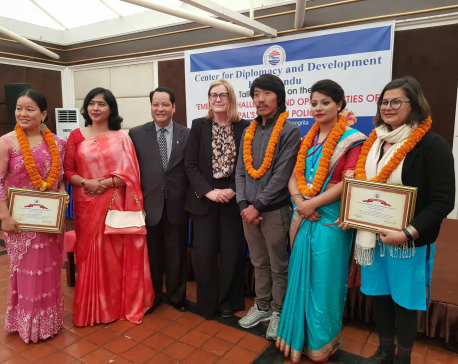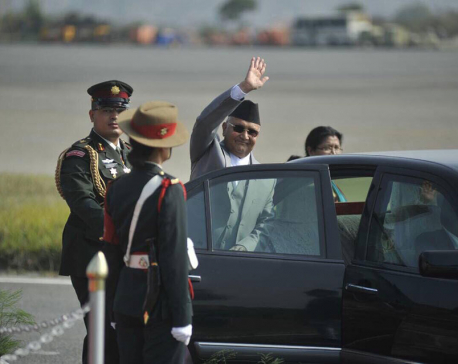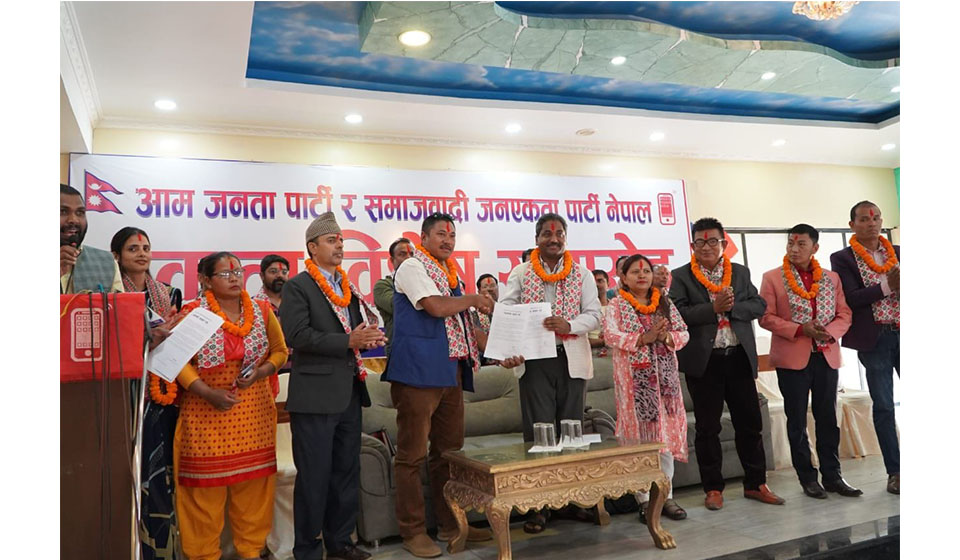
OR
Opinion

Non-alignment does not imply indifference to the day's pressing issues or to remain neutral or voiceless.
Nepal, in its neighborhood, is surrounded by countries with nuclear power in their arsenal: China, India, and Pakistan. These countries are so uniquely characterized that one is the arch-rival and adversary to the other, facing each other at the frontiers ready to engage in conflict at any time.
Nepal’s foreign policy guidelines are stated in the Constitution of Nepal as an obligation of the government to abide by its principles. International relations will be conducted through an independent foreign policy based on the Charter of the United Nations, non-alignment, principles of Panchsheel, international law, and the norms of world peace. The protection and promotion of national interest while safeguarding sovereignty, territorial integrity, and independence should be taken into consideration with care and caution in the conduct of international relations. This makes non-alignment an integral part of Nepal's foreign policy based on its historical legacy, as well as guided by its necessity and geographical, international, and domestic obligations for its survival and advancement.
Nepal, one of the ancient independent countries of Asia, has maintained its cherished history of independence and territorial integrity unscathed while its neighbors were brutally colonized by the mighty Western power, the United Kingdom. Nepal fought valiantly against the mighty aggressor and saved its sovereignty. It was not only Nepal’s fighting spirit but also the legacy and principled stand of non-aggression that unquestionably helped save its independence. Nepal never took an offensive posture until its sovereignty was threatened and attacked. The unifier of Nepal, the great King Prithvi Narayan Shah, in his ‘divine sermon’ while lying on his deathbed to the courtiers, mentioned Nepal as “a yam between two boulders,” clearly considering geographical constraints as its formidable empires with distinct characters to the North and South. Understandably, the late visionary king spelled out the intricacy of a nation trapped between the two physical, economic, and military giants. Pursuing peaceful co-existence, at the core of its state policy, is a natural phenomenon of survival by necessity to protect its independence and sovereignty.
The geographical compulsion, without any alternative, makes one need to learn the instinct of survival, adjusting its policy of realization, accommodation, and fulfillment of its national interest through a balancing act. Nepal is pursuing its foreign policy within the broad parameters of nationality, geography, culture, cooperation, and cultivation of friendship with all and enmity and animosity with none to fulfill its national interests. The global power balance does not always remain static but keeps on revolving, as seen in many empires rising and falling in history. Global powers emerged and dissolved over time. It is, therefore, a natural phenomenon that holds global powers in one axis or makes and breaks alliances as normal as it comes and goes. In consideration of this principle, the present global power equilibrium, which came into existence after World War II, is in the process of gradually changing from the commencement of the 21st century along with the peaceful rise of the People’s Republic of China.
A changing global scenario following the Cold War between the United States and USSR and a brief period of interlude after the dissolution of the USSR during the 1990s saw a unipolar world dominated by the USA. But with the financial crisis of 2007/8, the People’s Republic of China took the central stage in the international arena as a responsible player. Since the rise of China economically, technologically, and militarily, the global power balance has tilted towards the East, visibly forcing the USA to recalibrate and reconfigure its foreign policy thrust from Europe to the East, formulating the Asia pivot with Indo-Pacific purposefully to contain China. With the persuasion of the Indo-Pacific policy and the formation of Quad and AUKUS, the regional and international environment is undergoing a tectonic shift with far-reaching consequences.
After the birth of the United Nations after World War II, the world was divided into two power blocks – one led by the United States of America with laissez-faire economies on one side and the USSR of the socialists on the other. It was the time when most states of Asia and Sub-Saharan South Africa, whether protectorates, suzerainty, or colonies alike, gained independence during the 1960s and took the development path through independent foreign policy credentials, mostly following non-alignment as their ethos. However, approaching the next century, most of these Asian and South Saharan nations fell back to dictatorial regimes and tilted towards one or the other power blocks. Very few, including Nepal, are genuinely following the principle of peaceful coexistence and non-alignment as its core value in the conduct of foreign policy.
Nepal, in its neighborhood, is surrounded by countries with nuclear power in their arsenal: China, India, and Pakistan. These countries are so uniquely characterized that one is the arch-rival and adversary to the other, facing each other at the frontiers ready to engage in conflict at any time. Their adversary and counter-movement promptly affect Nepal in magnitude. Given Nepal's centrality and geographical proximity, its strategic importance has increased manifold.
With the so-called special military operation of Russia in Ukraine, an invasion, Russia’s relationship with the People’s Republic of China is consolidating further, and areas of cooperation are extending. The bond between the two leaders, Putin and Xi Jinping, is strengthening and further consolidating their personal and official friendship about understanding the global power equilibrium. Their interests are converging in one place, making the United States their common adversary. In such an evolving situation, Taiwan is apprehensive of China mounting military exercises from across the Taiwan Strait by over-flying Chinese surveillance planes. The apprehension has also been mounting that the People’s Republic of China may be emboldened by the actions of Russia and take the adventurism of taking military action over Taiwan to forcefully unite with mainland China.
In the case of the security of Taiwan, the Taiwan Relation Act of 1979 guides the US administration to take measures to protect Taiwan from any threat from outside. However, the policy ambiguity of the US administration cannot fully cover the assurance of Taiwan. Whenever national interests interact with global politics, the national interest prevails, and support does not come at a critical time, as in the case of Crimea. When Crimea was annexed by Russia forcefully, nobody condemned Russia, and it went unheard. The non-aligned countries also did not come out with strong condemnation of such an act. The acts of annexation of Tibet and Sikkim by China and India respectively were not different instances.
Since Russia invaded Ukraine, it has shattered the order established after World War II. Having been “strategically exposed” to Russia’s Ukraine war, Finland and Sweden, neighbors of Russia, have decided to give up their long-standing non-aligned status and join NATO. If the Russia-Ukraine conflict is not addressed timely, the possibility of its spillover to another region cannot be ruled out because of the existing unresolved regional disputes over boundary issues between China and India, India and Pakistan, for example. It is also likely that fundamental religious groups may be encouraged to consolidate and exacerbate their terrorist activities all over the world, encouraging the emerging regional powers to exercise their influence and potentially annex smaller nations or spheres of influence forcefully to come under their domain. India may find leverage to pressure on various neighboring countries including Bhutan, Nepal, the Maldives, Sri Lanka and Bangladesh.
China, however, followed the principle of peaceful coexistence and never became a member of the non-alignment movement. The Prime Minister of the People’s Republic of China, Chou En Lai, participated in the Bandung Afro-Asian conference but did not become a member of the movement.
Although India is a founding member of the non-aligned movement, Pandit Nehru, one of the founding fathers of the movement, adopted a liberal economic policy and started impressive economic growth lately. As its economic growth positions it as one of the regional powerhouses, its posture on international relations has implicitly changed, abandoning the non-alignment movement and tilting towards power blocks. Even in the past, India had a strategic partnership with the USSR as a major source of military hardware suppliers. After the ascendency of the BJP in power, there has been a fundamental shift in India’s handling of international relations where it seeks its role on the global stage.
Lately, India has been balancing Russia and the US, showing neutrality on the Ukraine war on one hand and participating in the Indo-Pacific strategy and Quad alignment to contain China on the other. On the other hand, it is also a member of the Shanghai Cooperation Organization and BRICS, aimed at countering Western hegemony. With the fifth-largest economy, India has adopted an ambiguous foreign policy over the decades.
It is assumed that sooner or later, India will form a strategic alliance with the Western power block. Already, there has been a statement by the Indian External Affairs Minister S. Jaishankar, stating that, in his opinion, non-alignment was for a specific era and a particular context. Recently, after the US’s policy shift to an Asia pivot and the adoption of an Indo-Pacific strategy to contain China, which entails encircling China in the Indo-Pacific Region, with its economic and strategic vitality vital for both global powers to maintain the sea-lane under their sphere of influence for commerce and transportation, the strategic importance of Nepal is visibly increasing, mainly due to Tibet being a core concern of China.
The direct and indirect intervention in Nepali politics by the global and regional power centers has become visible lately. While imparting training to a political party by a northern neighbor or creating a debate over the BRI and MCC compact, they were calibrating the impulse of Nepali politics and politicians, cautiously handling international relations concerning non-alignment and national interests. The persuasion of non-alignment as an important component of Nepal’s international relations is a necessity and has been followed in principle and practice with its continuity and unwavering support for the movement. Non-aligned countries also have a checkered history, going against their fundamental principles of Panchasheel, Non-aggression, and finding peaceful solutions to all disputes through mediation and consultation. However, Iran and Iraq were both members of the non-aligned movement, choosing bloody war for years. Similarly, Iraq’s occupation of a chunk of land of the State of Kuwait, although for a short period and released from its hold through US intervention, was also a flagrant violation of the spirit of non-alignment. The failures on its part from its ideal orientation are one of the causes seeking its relevance in the newly emerging world order mainly dominated by multiple power centers: the USA, China, and Russia, followed by the rising regional power blocks: India, Indonesia, South Africa, Germany, Japan, and Brazil.
Nepal’s UN vote on Russia’s invasion of Ukraine on February 24, 2022, unequivocally condemning it, demonstrates the continued relevance and significance of non-alignment in the conduct of its foreign policy, while its neighbors choose to remain neutral. Non-alignment does not imply indifference to the day's pressing issues or to remain neutral or voiceless. In its fundamental essence, it puts its voice forward without fear or favor, as Nepal voted on Russia’s invasion of Ukraine. We judge every international issue on its merit and consider national interest its first priority. In such a volatile situation, as the international balance of powers is being reshaped, Nepal, to protect its vital national interest, needs to cautiously realign, readjust, and balance its foreign policy formulation and implementation.
You May Like This

Nepal need not be for or against any other country: US official
KATHMANDU, May 15: While trying to allay concerns raised from various quarters that Nepal was pushed into its Indo-Pacific strategy—a move... Read More...

Experts advise Nepal to have a clear, proactive foreign policy
KATHMANDU, March 8: Foreign policy experts have stressed the need to articulate a clear foreign policy taking into account the national... Read More...

What Nepal needs is India's friendship and support for growth: Nepal PM Oli
In an exclusive interview to The Hindu, Mr. Oli says the bitterness of past relations have been put behind them,... Read More...


Just In
- Sunkoshi-Marin Diversion Project’s tunnel construction nears completion, breakthrough scheduled for May 8
- Govt tightens security arrangement for Third Investment Summit 2024
- Pesticide residue found in vegetables in Nepalgunj
- Aam Janata Party and Samajwadi Jana Ekata Party merge
- 1,600 participants confirmed for Nepal Investment Summit
- Ilam-2 by-elections held peacefully, vote count likely to start tonight
- NEA schedules five-day power cut across Kathmandu Valley for underground cable installation
- Hundreds of passengers including foreign tourists in distress as poor visibility halts flights to and from PRIA















-1200x560-wm_20240427144118.jpg)
Leave A Comment